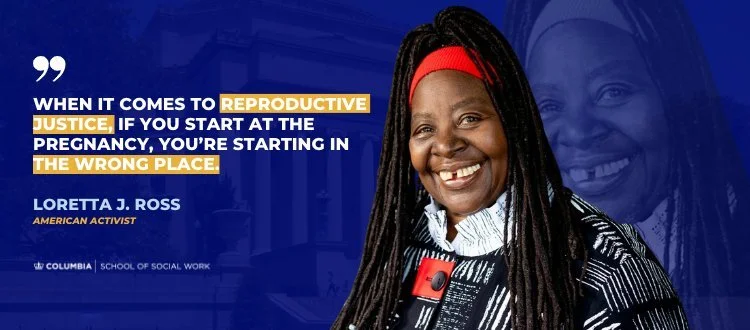Reproductive Justice
In 1994, while attending a convening to discuss then-President Clinton's proposed health care reform, a group of Black women gathered in Chicago to discuss their frustrations and concerns with how the need for comprehensive and accessible sex and reproductive healthcare was largely ignored by the white-led “pro-choice” movement. They understood that there were overlapping, and intersecting oppressions that not only denied people a “choice” became the tenets of Reproductive Justice.
Reproductive Justice (RJ) talks not only about access to abortion, but to all the ways that reproductive freedom is limited in our modern, white supremacist society and the ways a child is or is not brought into this world, from birth control to housing. RJ imagines a world in which every person has the financial and emotional resources to not only have a child when and how they wish but to raise them how and where they wish. This means working not only in a reproductive health lens but bringing racial justice, LGBTQ liberation, economic justice, disability justice, immigrant justice, criminal justice, environmental justice, food justice, and housing justice into the work. Without also addressing all of these intersecting issues, true reproductive freedom will never be achieved.
Reproductive Justice is:
A human right.
RJ is based on the United Nations’ internationally-accepted Universal Declaration of Human Rights, a comprehensive body of law that details the rights of individuals and the responsibilities of government to protect those rights.
About access, not choice.
Mainstream movements (often led by white, middle-class cis women) have focused on keeping abortion legal as an individual choice. That is necessary, but not enough. Even when abortion is legal, there are systemic, structural and often literal barriers to accessing reproductive healthcare. There is no choice where there is no access.
Not just about abortion.
Abortion access is critical, but RJ requires total sexual and reproductive autonomy. RJ aims to transform inequity so that all people have social, economic and political power as well as resources to make healthy decisions for their bodies, gender, sexuality and families.
The abortion access movement has been forever changed by that 1994 convening and the Black leaders who have continued to hold its mantle. It has pushed all of us to think and work more expansively and critically, and to identify the many ways oppression works. In so many ways, the work we do here at Apiary and the work of so many of our partners would not exist without them. We are forever grateful.
Shortly after that Chicago meeting, SisterSong was formed to create a national, multi-ethnic reproductive justice movement. Today, In Our Own Voice: National Black Women’s Reproductive Justice Agenda works on policy; Spark builds up new generations of Black leadership; the Black Women’s Health Initiative is the only national organization working solely for health equity for Black women. There are also the local, state and regional organizations that build local power based in a reproductive justice framework - ARC Southeast, SHEro, New Voices, and more.
We also give a special thanks to the women who attended that convening, built this framework and reshaped all of our work. Their names are: Toni M. Bond Leonard, Reverend Alma Crawford, Evelyn S. Field, Terri James, Bisola Marignay, Cassandra McConnell, Cynthia Newbille, Loretta Ross, Elizabeth Terry, ‘Able’ Mable Thomas, Winnette P. Willis, and Kim Youngblood.
Reproductive Justice has given thousands of people a framework to change policy and improve services towards our collective liberation.
Reproductive justice is a BLACK issue. In fact, the term and framework was created by Black women to ensure that we maintain the autonomy to make decisions for our own bodies and families.
Want more information?
Visioning New Futures for Reproductive Justice Declaration 2023 - SisterSong
Reproductive Justice Beyond Biology - Loretta J. Ross
Undivided Rights: Women of Color Organize for Reproductive Justice - (Book) Jael Silliman, Marlene Gerber Fried, Loretta Ross, Elena Gutierrez

